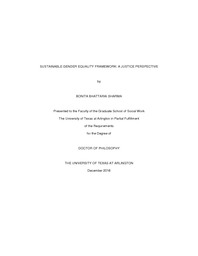
ATTENTION: The works hosted here are being migrated to a new repository that will consolidate resources, improve discoverability, and better show UTA's research impact on the global community. We will update authors as the migration progresses. Please see MavMatrix for more information.
Show simple item record
| dc.creator | Sharma, Bonita Bhattarai | |
| dc.date.accessioned | 2017-02-14T16:35:22Z | |
| dc.date.available | 2017-02-14T16:35:22Z | |
| dc.date.created | 2016-12 | |
| dc.date.issued | 2016-12-21 | |
| dc.date.submitted | December 2016 | |
| dc.identifier.uri | http://hdl.handle.net/10106/26432 | |
| dc.description.abstract | The current study emphasizes gender equality discourse within the frame of overarching sustainable development goals and proposes a shift in attention to the sustainability of components of a larger holistic social system that is built on moral imperatives of intra and intergenerational justice. The continued and building importance of the holistic and transferability of a just and inclusive system is indicative of the new global policy shift in addressing the lessons learned from past developmental approaches and the urgent need to protect the earth system. There are three key related issues that stand out within the broad context of Our Common Future published from the Brundtland Commission: 1) the intergenerational emphasis in development and addressing the needs explicit in the definition; 2) the added environmental focus to the previous development agenda of socio-economic advancement, and finally, 3) the related SDG goals and ways to measure their outcomes in the new policy spectrum. Given the several short comings, this study develops a framework focusing on the sustainability of gender equality and addresses the theoretical and methodological gaps in the existing literature. It tests the framework of social, natural, economic, built and human capital influence on sustainable gender equality while understanding the role of women’s rights in promoting sustainable gender equality. The study recommends investment in women’s rights and systematically accounting women and girls by addressing pervasive gender data gaps and gender biases in measures as important steps towards sustainable gender equality.
In Chapter I, amidst all the debate around sustainable development, this chapter identifies a lack of quantitatively tested framework for sustainable gender equality. It proposes to test the moderating effect of women’s rights on capital and sustainable gender equality. It also proposes to test the structural framework of sustainable gender equality.
Chapter II covers the literature on much debated environment and the place of gender role in sustainable development. It looks at historical events and policies that brought environmental focus within the scope of economic and social development.
Chapter III, reviews literature on values of social justice, particularly freedom to do and be, equality and fairness within the context of sustainable development. It highlights the economics of sustainable development and the capital perspectives based on modernization theory on global development. These three concepts are at the heart of sustainable gender justice debates and this chapter provides the conceptual grounding for this study.
In Chapter IV, this study presents the conceptual framework and the proposed hypotheses that guide the analyses.
Chapter V presents the methodology applied in testing the proposed hypotheses and the final model. It covers the source of data, sample, data screening, analysis, indices developed, regressions and structural model.
Finally, in Chapter VI, the study ties the literature, theoretical guidance, and analyses to discuss the outcome of the quantitative analysis in the study. It further highlights the future directions, strengths and limitations, and implications of the study for social work. | |
| dc.format.mimetype | application/pdf | |
| dc.subject | Gender equality | |
| dc.subject | Sustainable | |
| dc.subject | Justice | |
| dc.subject | Development | |
| dc.subject | Structural model | |
| dc.subject | Moderation effects | |
| dc.title | SUSTAINABLE GENDER EQUALITY FRAMEWORK: A JUSTICE PERSPECTIVE | |
| dc.type | Thesis | |
| dc.contributor.committeeMember | Pillai, Vijayan K. | |
| dc.contributor.committeeMember | Elliott, Doreen | |
| dc.contributor.committeeMember | Mitschke, Diane B. | |
| dc.contributor.committeeMember | Praetorius, Regina T. | |
| dc.degree.department | Social Work | |
| dc.degree.name | Doctor of Philosophy in Social Work | |
| dc.date.updated | 2017-02-14T16:36:26Z | |
| thesis.degree.department | Social Work | |
| thesis.degree.grantor | The University of Texas at Arlington | |
| thesis.degree.level | Doctoral | |
| thesis.degree.name | Doctor of Philosophy in Social Work | |
| dc.type.material | text | |
Files in this item
- Name:
- SHARMA-DISSERTATION-2016.pdf
- Size:
- 1.176Mb
- Format:
- PDF
This item appears in the following Collection(s)
Show simple item record


